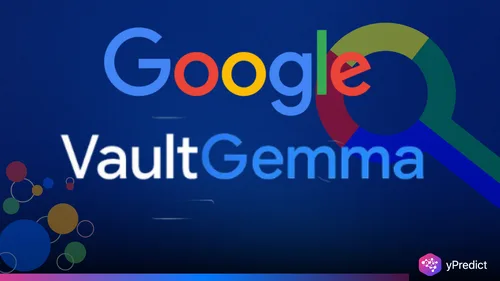
Artificial intelligence continues to evolve at a breakneck pace, but one question lingers: how do we make it safe for private data? Most large language models are known to memorize training data, creating serious risks when sensitive information leaks into outputs. This has sparked an urgent need for solutions that prioritize privacy without sacrificing performance.
Google has taken a bold step in this direction with the launch of VaultGemma, the world’s most advanced differential privacy LLM. Developed jointly by Google Research and DeepMind, VaultGemma is not just another model release. It is a pioneering effort to prove that privacy and capability can coexist in the world of large language models. For the first time, developers and researchers now have access to an open, billion-parameter model trained entirely with differential privacy.
VaultGemma’s arrival represents a success beyond this technology. It is a philosophical shift in AI design, a shift that values securing data integrity just as highly as improving model performance. VaultGemma provides proof that AI can simultaneously be powerful and responsible, with privacy embedded at its most fundamental level.
Why Memorization in AI Models Poses a Risk
Large language models process vast amounts of information during training. Along the way, they often memorize sensitive details, from private conversations to proprietary data. When such memorization seeps into responses, it can lead to unintentional leaks that threaten user trust and safety.
This is where differential privacy LLM technology proves its worth. Through the process of injecting calibrated noise into the training, differential privacy prevents the models from being able to remember or recall any individual’s data. The model only learns generalized patterns, therefore, while it increases utility, it also removes the ability to memorize. However, for many years this approach had significant trade-offs.
The Challenge of Applying Differential Privacy to LLMs
Differential privacy has long been recognized as a gold standard for data protection. Yet its application to large language models has been notoriously difficult. Adding noise during training often disrupts stability, increases costs, and reduces overall performance. As a result, privacy focused AI solutions have typically lagged far behind their non-private counterparts.
For researchers, the challenge was to find a balance between compute resources, privacy safeguards, and model performance. Previous attempts often fell short, leaving many to wonder whether a large-scale, useful differential privacy LLM could ever exist.
Google Research and DeepMind Breakthrough with VaultGemma
The release of VaultGemma changes that narrative. By deriving new scaling laws for differentially private training, Google Research and DeepMind discovered rules that govern how compute, noise, and accuracy interact. These scaling laws provided a roadmap for building models that remain stable and high-performing even under the constraints of differential privacy.
VaultGemma is the first billion-parameter open model that meets this standard. It demonstrates that with the right mathematical foundation, a privacy focused AI can deliver strong capabilities without compromising data security. This is a major milestone for the field and one that signals the dawn of a new era in private AI development.
Why VaultGemma Matters for the Future of AI
VaultGemma is not simply a research project. It creates a framework for safer deployments in industries where privacy is paramount. Health, finance, and enterprise software are just a few of the industries where organizations can now validate AI solutions that incorporate robust natural language capability while adhering to privacy statutes.
With open-sourcing VaultGemma, the research community also is now free to investigate, enhance, and continue scaling these innovations. Google has certainly elevated the discourse on what responsible AI development should entail. The ripple effect may extend throughout the industry as many developers elevate their attempts to built AI models that are privacy-first.
Final Thoughts on VaultGemma and the Path Ahead
The introduction of VaultGemma marks a significant milestone in AI history. For the first time, a differential privacy LLM has illustrated that frontiers of performance and privacy can overlap. Google Research and DeepMind has illustrated that the future of AI need not experience power over protection, or vice versa.
Google has demonstrated with a model that is open and equal across all usages that AI can serve society without putting sensitive data at risk. We can expect, as the ecosystem iterates, VaultGemma will create additional opportunities and advances towards a more equitable, trustworthy, and transparent space.






